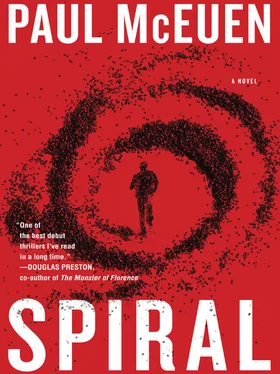“Kaname Akamatsu’s ‘flying geese’ model of Asian cooperation,” Dunne said. “The economies of Asia would develop in the mythical pattern of flying geese, with Japan at the lead and the other nations—China, Korea, Malaysia, and the like—following behind.”
“And book number three?”
“Yukio Mishima. Sun and Steel: art, action, and ritual death.”
Dunne nodded. “Kitano idolized Mishima.”
“Why would he idolize a Japanese novelist?”
“Because of how he died. Mishima killed himself in 1970. He was only forty-five and a huge cultural figure. He took the commandant of the Japan Self-Defense Forces hostage, then gave a speech from a balcony in Tokyo, demanding a return to rule by the emperor. He was trying to incite the Japanese military. Then he went inside and disemboweled himself.”
“Why?”
“He thought Japan had been emasculated at the end of the war. He was a fanatical believer in Bushido—the way of the warrior. Kitano bought the sword that was used by Mishima’s second to cut off his head. Kept it hung on his wall of his study.” Dunne watched the old man. Kitano had fought for a victorious Japan but over the years he had come to believe in wealth as much as in force. He helped rebuild the Japanese industrial base and pushed for an expanded role of the military in Japanese society. The way to a reemergent Japan was through both the yen and the sword. But Japan had slipped beneath the waves of history. China was the new dragon.
Dunne knew Kitano’s history like he knew his own. Sixty-four years before, after the events on the Vanguard , Kitano had been held in a military brig in Honolulu. The Pacific Command had launched a furious search for the other submarines, each purported to have a brass cylinder containing the Uzumaki. Over the years they’d recovered five of those original seven cylinders, four right after the war, including the one found by the Vanguard , and a fifth in the 1970s in a wreck off the southern California coast. The final two, assuming they existed, were never found.
Kitano had been held in a cell no larger than a closet for months on end, a beast in a cage, furious and raging. He had been questioned mercilessly, threatened repeatedly with trial and execution for war crimes. He claimed to have told them everything he knew—names of the Tokkō, information on their targets. They kept squeezing him until MacArthur cut a deal with Shiro Ishii. In May of 1947, Ishii turned over some ten thousand pages of records documenting the “research findings” obtained at Unit 731 about biological weapons, including the Uzumaki, in exchange for immunity. The prosecutions of all Unit 731 personnel were terminated, and Kitano was freed.
After his release, Kitano became part of a network of Unit 731 veterans who took up positions of authority within the Japanese medical and pharmaceutical industries. He was a cofounder of Green Cross, a Japanese pharmaceutical company that rose to prominence after the end of World War II. Green Cross ran one of the larger blood banks in Japan, and Kitano profited handsomely. Kitano abruptly left Green Cross in the early 1980s, selling his stake for in excess of two hundred million dollars. Soon after, Green Cross became enmeshed in controversy for knowingly selling HIVtainted blood. Approximately a thousand Japanese contracted the disease and eventually died.
Kitano took his money and moved to the United States. He bankrolled various biological start-ups, both in La Jolla and north, in Silicon Valley. A few of these hit it big, and by the mid-1990s Kitano’s net worth was approaching the five-billion mark. Through the 1990s, Kitano amassed even more with investments in a number of health-related dot-coms, clearly seeing both the promise and the hype of the Internet. In 2000, he divested from Silicon Valley just before the bust. He was flush with cash, looking for the next wave.
After the events of September 11, he saw it. The Kitano Group, his investment firm, poured money into military-related start-ups, correctly predicting that an administration unwilling by temperament to expand a federal bureaucracy would be dumping money into the private sector. They invested in companies that provided the military with everything from data-mining services to personnel. Kitano himself had personally overseen the group’s investments in biotech ventures, particularly those aimed at bioterrorism countermeasures. They had large positions in most of the major players, from Genesys to DNA Biosystems. Kitano had also begun acquiring biotechnology companies in Japan, Korea, and China, constructing a pan-Asian network that would be the cornerstone of economic progress in the region as synthetic biology replaced silicon microelectronics as the dominant growth technology.
Kitano was not just involved in business ventures. He had also carefully cultivated relationships with a number of prominent American foreign-policy hawks, Lawrence Dunne among them. Kitano funded a trio of neoconservative, pro-Japanese think tanks, including one where Dunne had camped out between posts in Washington and stints teaching. They were a formidable team, working in concert to build a bulwark against the rising power of the Chinese. Their greatest achievement being, of course, the election of the current president of the United States, a pro-America, anti-China crusader.
Kitano had also helped Dunne take a modest nest egg and turn it into a not-so-modest nest egg. He’d also introduced Dunne to some of the other pleasures to be had by those of great wealth and power. Most of Dunne’s colleagues did their best to keep Kitano at arm’s length. Stories still surrounded him, rumors about his role in the Japanese war effort in World War II. This history drew Dunne like a moth. For almost two decades, the two men forged a professional and personal relationship based on their mutual distrust of China and their love of expensive scotch and women.
Kitano had it all—an enormous economic empire, and the ear of the most powerful government on the planet.
Then the old man fucked up.
KITANO WAS A STATUE, COMPLETELY MOTIONLESS AS HE SAT dead in the center in his cell.
“Does he know he’s being watched?” Dunne asked.
“He’s never shown signs. Never looks up. Nothing.” Robbins shook his head. “I don’t get it. His routine was normal this morning.”
“Show me.”
Robbins hit a few keys and an image on a second screen appeared, the time stamp showing seven-twenty-two a.m. Kitano was doing some kind of knee bends. “Every morning he performs a half-hour of calisthenics. After that he reads until the gates open and he’s allowed to visit the common room. There he watches television. Give me a second. We’ve got a camera in there, too. I’ll bring up the video from this morning.”
The image shifted. The time stamp said eight-oh-four a.m. Kitano sat alone in a chair, watching television, rapt. The rest of the prisoners sat as far away as possible, clearly avoiding him.
Dunne knew why. Soon after arriving at USP Hazelton, a prisoner stole Kitano’s lunch, thinking him to be a powerless old man. Kitano didn’t react. But two days later, the guy’s wife, a waitress in East Fishkill, New York, was bludgeoned almost beyond recognition. They had to use DNA to make the identification. The next day, the prisoner himself was found dead, bled out from a massive cut across the belly. Kitano’s alibi was unassailable: he was locked in his cell. There was no evidence connecting Kitano to any of it, but after that the other inmates avoided Hitoshi Kitano like the plague.
Dunne focused on the screen. Kitano was watching the television with great concentration.
“What’s he watching?”
“Just a second.” He hit a few more keys, and the screen split, the right showing a feed from CNN, with a time stamp that matched the one from the camera showing Kitano.
Читать дальше












